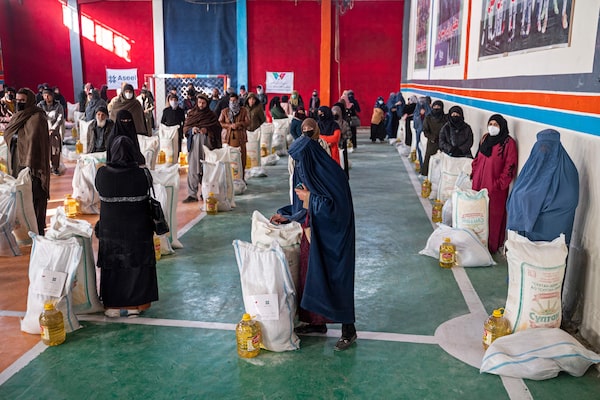
Afghan people stand with food aid being distributed by a non-governmental organization (NGO) at a gymnasium in Kabul on Jan. 17. At least three leading international aid agencies have partially resumed life-saving work in Afghanistan, after assurances from the Taliban authorities that Afghan women can continue to work in the health sector.WAKIL KOHSAR/AFP/Getty Images
In a home that’s been converted to a clinic in a remote district in southern Afghanistan, Mahdi counsels women who are survivors of domestic abuse. While she puts in gruelling hours doing difficult work, her brother sits in a separate room, collecting half her paycheque.
In December, the Taliban announced a ban preventing women from working for non-governmental organizations in the country. Later they introduced a few exceptions – notably for those working in health care. But the stipulation for most of the women with jobs at NGOs is that they have a male relative accompany them while they are at work.
That comes with its own set of challenges. Many women do not have a close male relative – or mahram – available who meets the rules to act as a chaperone. Those who do told The Globe and Mail that economically, it doesn’t make sense. They have to share their paycheques with the chaperone and cover their costs, which often include transportation and meals. The women are also fearful their male chaperones will find jobs of their own, and then the women will have to abandon their careers.
Mahdi said the only reason she’s able to continue working is because her job is in health care and she has a mahram to go with her. The Globe is identifying her only by her first name because she fears for her safety.
The Taliban decision to ban women from working for NGOs in Afghanistan sparked outrage around the world, with aid leaders saying women are needed to deliver life-saving support.
Last month, Martin Griffiths, a UN emergency relief co-ordinator, said he and other aid leaders met with Taliban officials to express their opposition and called for additional sectors to be granted exceptions or for women to be authorized to work. He said they were told arrangements were coming.
Women wait to register for food aid from the World Food Program in Kabul on Jun. 16, 2022. Since the Taliban administration banned women from aid work, many groups have suspended their operations in the country and warned of permanently shutting down if the ban remains.KIANA HAYERI/The New York Times News Service
Mahdi, 22, is a counsellor and midwife and says most of her work involves helping women who have been abused by their husbands or relatives. She does this job all while her 25-year-old brother sits in a separate room with other male chaperones who are accompanying their female relatives to work.
“When there is not a mahram, they prevent us from going to work,” she said, adding that she is often randomly stopped at checkpoints and asked questions to confirm that her chaperone really is her brother.
The most frustrating part, she said, is that she has to share half of her salary with him and also pay for his food and transportation. She’s also worried that one day her brother will get a job that pays more than what she’s giving him.
“I will lose my job if that’s the case … and every day, the rules are more strict.”
Since the Taliban took control of Afghanistan in August, 2021, they have consistently rolled back the rights of women and girls, first preventing girls from going to school past Grade 6, later banning women from going to university and limiting their opportunities to work.
A group of women wearing burqas crosses the street as members of the Taliban drive past in Kabul on Oct. 9, 2021.Jorge Silva/Reuters
In Herat, Azita Kakar, a 41-year-old psychiatrist, counsels women and families in remote districts and works on programs that prevent malnutrition. She brings her sister’s 22-year-old son along with her.
She said she can only travel from her home to the site where she’s meeting patients and is no longer allowed in her organization’s office.
Dr. Kakar said while she’s allowed to go to work with her male chaperone, her salary has not changed – but now she has to share it with him and pay for his expenses.
“The decrees are coming one after another after another,” she said.
Another therapist, Samira Omarzai, said she used to help women with problem-solving, but lost her job because she doesn’t have an available male chaperone. Many other women lost their work for the same reason, she said.
“I know psychological problems. I used to be a counsellor for that, but now I’m depressed,” she said.
She said the organization she was working for waited more than a month for its female employees to find male chaperones – and eventually stopped the project because there were no women able to work under the Taliban rules.
“This was not good decision economically and also this is not in Islam to prevent women from education and from work. This is a new thing. I did not hear that in my life.”
 Janice Dickson
Janice Dickson